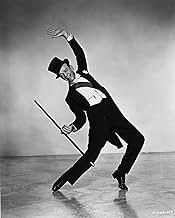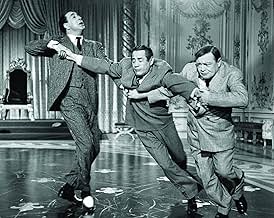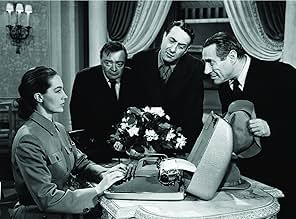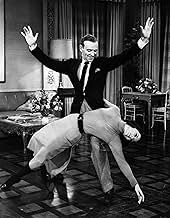IMDb-BEWERTUNG
6,8/10
4481
IHRE BEWERTUNG
Füge eine Handlung in deiner Sprache hinzuA Russian government official is sent to Paris to bring back her comrades; she soon gets a taste of Paris life and falls in love with an American movie producer.A Russian government official is sent to Paris to bring back her comrades; she soon gets a taste of Paris life and falls in love with an American movie producer.A Russian government official is sent to Paris to bring back her comrades; she soon gets a taste of Paris life and falls in love with an American movie producer.
- Auszeichnungen
- 5 Nominierungen insgesamt
Don Anderson
- Restaurant Patron
- (Nicht genannt)
Edit Angold
- Wife
- (Nicht genannt)
Frank Arnold
- Soviet Guard
- (Nicht genannt)
Susan Avery
- Model
- (Nicht genannt)
Virginia Bates
- Model
- (Nicht genannt)
Herman Belmonte
- Reporter
- (Nicht genannt)
Rodney Bieber
- Dancer
- (Nicht genannt)
John Bleifer
- Tenant
- (Nicht genannt)
Empfohlene Bewertungen
Silk Stockings is not one of MGM's best films, with it just lacking their earlier films' sparkle, and it is not as good as Ninotchka(a Greta Garbo and Ernst Lubitsch gem), that it's a remake of. However, while it has its flaws, it is eminently watchable and is good entertainment.
The film is a handsome-looking film, especially in the sumptuous sets, though the colourful and expansive photography, not-too-bright-not-too-drab lighting and elegant costumes also delight. The music is energetic and whimsical and the songs, while not among Cole Porter's best(Ritz Rock and Roll is a little dull and tired) are very good, with memorable melodies and Porter's usual wit evident. All of You and Paris Loves Lovers are dreams come true for Fred Astaire and Cyd Charisse lovers, but the highlight is the enormously fun Stereophonic Sound, Siberia has some funny moments but not for all tastes. Choreographically Silk Stockings is splendid, but does not waste Astaire or Charisse's talents at all, the songs I mentioned as highlights are also the highlights for the choreography, and while Ritz Rock and Roll is tired song-wise Astaire's dancing certainly is not.
Also present are a very clever script, where most of the humour sparkles and the romantic parts have the right balance of sweetness and magic while not feeling too much, it also has a good deal of warmth chemistry-wise which stops it from feeling cold and underdeveloped. The film is warm-hearted, good-humoured and light-footed on the most part, and is competently directed, while the cast are as splendid as the choreography. Astaire is as charming and graceful as ever, and Charisse is glamour and elegance personified. Janis Paige is hilarious, and comes close to stealing the show in Stereophonic Sound, and Peter Lorre and Jules Munshin are amusing, though both have given better performances elsewhere.
It's not a flawless film though. It does get heavy-handed in places and occasionally over-plotted, the anti-Russian jokes may leave a sour taste in the mouth and as aforementioned the Ritz Rock and Roll lacks the energy and is not as memorable or up-to-tempo as the rest of the film.
Despite the problems, Silk Songs is very watchable and fun and an above decent but inferior musical remake of Ninotchka. 7/10 Bethany Cox
The film is a handsome-looking film, especially in the sumptuous sets, though the colourful and expansive photography, not-too-bright-not-too-drab lighting and elegant costumes also delight. The music is energetic and whimsical and the songs, while not among Cole Porter's best(Ritz Rock and Roll is a little dull and tired) are very good, with memorable melodies and Porter's usual wit evident. All of You and Paris Loves Lovers are dreams come true for Fred Astaire and Cyd Charisse lovers, but the highlight is the enormously fun Stereophonic Sound, Siberia has some funny moments but not for all tastes. Choreographically Silk Stockings is splendid, but does not waste Astaire or Charisse's talents at all, the songs I mentioned as highlights are also the highlights for the choreography, and while Ritz Rock and Roll is tired song-wise Astaire's dancing certainly is not.
Also present are a very clever script, where most of the humour sparkles and the romantic parts have the right balance of sweetness and magic while not feeling too much, it also has a good deal of warmth chemistry-wise which stops it from feeling cold and underdeveloped. The film is warm-hearted, good-humoured and light-footed on the most part, and is competently directed, while the cast are as splendid as the choreography. Astaire is as charming and graceful as ever, and Charisse is glamour and elegance personified. Janis Paige is hilarious, and comes close to stealing the show in Stereophonic Sound, and Peter Lorre and Jules Munshin are amusing, though both have given better performances elsewhere.
It's not a flawless film though. It does get heavy-handed in places and occasionally over-plotted, the anti-Russian jokes may leave a sour taste in the mouth and as aforementioned the Ritz Rock and Roll lacks the energy and is not as memorable or up-to-tempo as the rest of the film.
Despite the problems, Silk Songs is very watchable and fun and an above decent but inferior musical remake of Ninotchka. 7/10 Bethany Cox
With the passing of Cyd Charisse last week at age 86, it's worth seeking out what is probably her finest work on celluloid. As an actress, she was bland. As a singer, she was dubbed (this time by the sonorous-sounding Carole Richards). But as a dancer, she was extraordinary. Along with Vera-Ellen, the ballet-trained Charisse was in the top echelon of the female dancers MGM showcased during the studio's golden years of which this film is one of its final stops. The clearest evidence of this claim can be found in the title tune when she dances with beauty and precision elegantly changing from her drab street clothes into silk and satin. It's a remarkable number, no small feat since her co-star is Fred Astaire. Directed by early musical maven Rouben Mamoulian in what turned out to be his last film, the movie also marks Astaire's swan song as a musical comedy leading man. Symbolically, he smashes his top hat at the end of his final solo number, "The Ritz Roll and Rock". The wear barely shows in his dancing where he pulls off some of his most acrobatic numbers, but other than the professionalism of the two leads, the inspiration seems sadly missing.
The film is a partial remake of Ernst Lubitsch's 1939 classic comedy, "Ninotchka" - in fact, some scenes are repeated verbatim - although certain elements have been altered to accommodate Cole Porter's musical score. This musical translation first showed up on Broadway two years earlier, but further revisions have obviously been made to tailor the story to the dancing talents of the leads. Charisse has the unenviable task of stepping into Greta Garbo's shoes as top Soviet envoy Ninotchka Yoschenko, who is sent to Paris to retrieve three lesser envoys swept up by the City of Lights. They had already botched their mission to lure famous Russian composer Peter Boroff back to the mother country. At the same time, American movie producer Steve Canfield wants Boroff to score his next picture, a musical bowdlerization of Tolstoy's "War and Peace" starring comically curvaceous Peggy Dayton, a parody of an Esther Williams-style swimming star whose been in the pool too long. As Dayton uses her feminine wiles to entice Boroff, Canfield tries to seduce Ninotchka, a far frostier proposition though the eventual thawing is inevitable. Porter's music has that effect or so we are led to believe.
Playing another variation on the worldly photographer he played in the same year's "Funny Face", Astaire is still at the top of his game, but his dance numbers are less elegant and appear markedly shorter than usual here. Charisse cannot compare to the legendary Garbo when it comes to line readings as a stoic communist. However, her dancing truly transcends not only the title tune but also "The Red Blues", an impressive ensemble number showcasing Charisse in a variety of dance styles, and the two duets with Astaire to "All of You" - the first a romantic defrosting of Ninotchka and the second a jauntier, rhythmic pas-de-deux. I wish the rest of the film was as good, but sadly, the energy wavers and the pacing flags during its 117-minute running time. The rest of the cast is serviceable, in particular, Janis Paige on familiar ground as Peggy (nicely paired with Astaire on the energetically cynical "Stereophonic Sound") and George Tobias as the deadpan Soviet commissar. Peter Lorre ("M") and Jules Munshin (Ozzie in "On the Town") show up as two of the bumbling envoys. The 2003 DVD has some interesting extras beginning with a ten-minute featurette featuring a 2003 interview with the still-elegant Charisse in "Cole Porter in Hollywood: Satin and Silk". Because of the Porter tie-in, there is also a 1934 Bob Hope short, "Paree, Paree", a silly musical comedy with Hope wooing singer Dorothy Stone. Also included is the original theatrical trailer, as well as "Poet and Peasant Overture" with Alfred Wallenstein conducting the MGM symphony orchestra playing the Franz Von Suppe piece as an overture to the movie.
The film is a partial remake of Ernst Lubitsch's 1939 classic comedy, "Ninotchka" - in fact, some scenes are repeated verbatim - although certain elements have been altered to accommodate Cole Porter's musical score. This musical translation first showed up on Broadway two years earlier, but further revisions have obviously been made to tailor the story to the dancing talents of the leads. Charisse has the unenviable task of stepping into Greta Garbo's shoes as top Soviet envoy Ninotchka Yoschenko, who is sent to Paris to retrieve three lesser envoys swept up by the City of Lights. They had already botched their mission to lure famous Russian composer Peter Boroff back to the mother country. At the same time, American movie producer Steve Canfield wants Boroff to score his next picture, a musical bowdlerization of Tolstoy's "War and Peace" starring comically curvaceous Peggy Dayton, a parody of an Esther Williams-style swimming star whose been in the pool too long. As Dayton uses her feminine wiles to entice Boroff, Canfield tries to seduce Ninotchka, a far frostier proposition though the eventual thawing is inevitable. Porter's music has that effect or so we are led to believe.
Playing another variation on the worldly photographer he played in the same year's "Funny Face", Astaire is still at the top of his game, but his dance numbers are less elegant and appear markedly shorter than usual here. Charisse cannot compare to the legendary Garbo when it comes to line readings as a stoic communist. However, her dancing truly transcends not only the title tune but also "The Red Blues", an impressive ensemble number showcasing Charisse in a variety of dance styles, and the two duets with Astaire to "All of You" - the first a romantic defrosting of Ninotchka and the second a jauntier, rhythmic pas-de-deux. I wish the rest of the film was as good, but sadly, the energy wavers and the pacing flags during its 117-minute running time. The rest of the cast is serviceable, in particular, Janis Paige on familiar ground as Peggy (nicely paired with Astaire on the energetically cynical "Stereophonic Sound") and George Tobias as the deadpan Soviet commissar. Peter Lorre ("M") and Jules Munshin (Ozzie in "On the Town") show up as two of the bumbling envoys. The 2003 DVD has some interesting extras beginning with a ten-minute featurette featuring a 2003 interview with the still-elegant Charisse in "Cole Porter in Hollywood: Satin and Silk". Because of the Porter tie-in, there is also a 1934 Bob Hope short, "Paree, Paree", a silly musical comedy with Hope wooing singer Dorothy Stone. Also included is the original theatrical trailer, as well as "Poet and Peasant Overture" with Alfred Wallenstein conducting the MGM symphony orchestra playing the Franz Von Suppe piece as an overture to the movie.
Clever, witty and charming musical, courtesy M.G.M. and the Arthur Freed unit, of which this was one of their last films. One of several musical remakes (of non-musical pictures) that the studio produced in the mid-late 1950s. This is one of the best.
Fred Astaire plays his usual character, the playboy-ish bachelor, in this case a film producer, wanting to use a Russian composer's music for his new film. Cyd Charisse plays Ninotchka, the Russian woman who comes to Paris to bring back the composer and three comrades who failed to return him to his native land. As the three comrades, Jules Munshin, Peter Lorre (holding onto a chair as he dances), and Joseph Buloff are a hoot, adding good comic relief in their "Too Bad" and "Siberia" numbers. Janis Paige is a jewel as the ditzy actress hired for the new film. She radiates with Astaire in the memorable "Stereophonic Sound" number, as well as in her own hilarious "Satin and Silk".
Charisse, (whose wooden acting is OK here), is lovely as usual and has a few excellent dances, including the sensual "All of You" (with Astaire), the lively "Red Blues", and the stunning ballet where she removes her old Russian garb, for her new Parisian silks. This was the second of her two pairings with Astaire, and though this is not the gem that "The Band Wagon" is, it still sparkles nonetheless.
A clever and classy musical, with some very topical humor. Great songs by Cole Porter (with the exception of the tacky "Ritz, Roll and Rock"...a poor punch at rock and roll). Excellent use of color and the Cinemascope frame help to make this one of the last great musicals of the 1950s.
Fred Astaire plays his usual character, the playboy-ish bachelor, in this case a film producer, wanting to use a Russian composer's music for his new film. Cyd Charisse plays Ninotchka, the Russian woman who comes to Paris to bring back the composer and three comrades who failed to return him to his native land. As the three comrades, Jules Munshin, Peter Lorre (holding onto a chair as he dances), and Joseph Buloff are a hoot, adding good comic relief in their "Too Bad" and "Siberia" numbers. Janis Paige is a jewel as the ditzy actress hired for the new film. She radiates with Astaire in the memorable "Stereophonic Sound" number, as well as in her own hilarious "Satin and Silk".
Charisse, (whose wooden acting is OK here), is lovely as usual and has a few excellent dances, including the sensual "All of You" (with Astaire), the lively "Red Blues", and the stunning ballet where she removes her old Russian garb, for her new Parisian silks. This was the second of her two pairings with Astaire, and though this is not the gem that "The Band Wagon" is, it still sparkles nonetheless.
A clever and classy musical, with some very topical humor. Great songs by Cole Porter (with the exception of the tacky "Ritz, Roll and Rock"...a poor punch at rock and roll). Excellent use of color and the Cinemascope frame help to make this one of the last great musicals of the 1950s.
As "Silk Stockings" reaches the half-century mark, it is now so dated that it can be enjoyed either as a period piece, as a look at popular attitudes toward the Cold War, as a rather silly but enjoyable setting for the odd couple of Cyd Charisse and Fred Astaire, or as a chance to see character actors like Jules Munchin and Peter Lorre. You know it's an old movie when Technicolor and stereophonic sound are being touted as the new big things!
Whether you like the main movie or not, the DVD extras have their own charm. The Special Features section includes a short film with Cyd Charisse as narrator, made about 2003, in which she talks about Cole Porter, Fred Astaire, and how the film came to be. Another short b/w film from the thirties is called "Paree, Paree". This one stars a very young Bob Hope, and features Cole Porter songs from the musical "20 Million Frenchmen".
Another musical treat is the "Poet and Peasant Overture", written by Franz von Suppe, played by the full studio orchestra. Both the 'Paree' film and this overture will tease you with musical strains familiar to those of us who grew up with old cartoons, so be warned! Listening to this music may induce animation flashback.
Whether you like the main movie or not, the DVD extras have their own charm. The Special Features section includes a short film with Cyd Charisse as narrator, made about 2003, in which she talks about Cole Porter, Fred Astaire, and how the film came to be. Another short b/w film from the thirties is called "Paree, Paree". This one stars a very young Bob Hope, and features Cole Porter songs from the musical "20 Million Frenchmen".
Another musical treat is the "Poet and Peasant Overture", written by Franz von Suppe, played by the full studio orchestra. Both the 'Paree' film and this overture will tease you with musical strains familiar to those of us who grew up with old cartoons, so be warned! Listening to this music may induce animation flashback.
Like so many films produced in the mid- to late Fifties and early Sixties, when CinemaScope and other widescreen processes enhanced a production, directors and cinematographers were usually unafraid to take full advantage of the wider ratio. They weren't so concerned about how the final product would look on TV's square screens and probably didn't anticipate the visual desecration of "formatting" and "pan-and-scan" reductions. So it's nice to know that this musical, filmed when M-G-M was about to throw in the musical towel and bid an undeserved farewell to the Arthur Freed "unit," can now be enjoyed again close to its original theatrical aspect ratio on DVD.
Astaire and Charisse are a team to be treasured (so wonderful together in "The Band Wagon" a few years earlier, under Minnelli's astute guidance) and all of the others listed in this film's credits are professionals of the highest caliber. Astaire has a fun solo (with a chorus of top-hatted dancers) in the "Ritz Roll 'n' Rock" number; Cyd gets to put those legendary legs to dazzlingly opulent use in the "Red Blues" production show-stopper; and even Janis Paige gets to raunch it up in an amusing example of clever Cole Porter risking something risqué (for its day) in a song about the Empress Josephine, "commonly known as Jo"! And there's that first reel number, "Stere-oh-phonic Sound," that cleverly spoofs the contemporary moviemakers' attempts to lure people from their TV sets with widescreens, sound coming from every corner of the auditorium and eye-glazing color processes. It may not be prime Porter but it's all far-and-away more fun and enjoyable than anything we're likely to get today with the threatened revival of the movie musical with barbarians like Baz Luhrmann given the directorial reins.
Astaire and Charisse are a team to be treasured (so wonderful together in "The Band Wagon" a few years earlier, under Minnelli's astute guidance) and all of the others listed in this film's credits are professionals of the highest caliber. Astaire has a fun solo (with a chorus of top-hatted dancers) in the "Ritz Roll 'n' Rock" number; Cyd gets to put those legendary legs to dazzlingly opulent use in the "Red Blues" production show-stopper; and even Janis Paige gets to raunch it up in an amusing example of clever Cole Porter risking something risqué (for its day) in a song about the Empress Josephine, "commonly known as Jo"! And there's that first reel number, "Stere-oh-phonic Sound," that cleverly spoofs the contemporary moviemakers' attempts to lure people from their TV sets with widescreens, sound coming from every corner of the auditorium and eye-glazing color processes. It may not be prime Porter but it's all far-and-away more fun and enjoyable than anything we're likely to get today with the threatened revival of the movie musical with barbarians like Baz Luhrmann given the directorial reins.
Wusstest du schon
- WissenswertesAfter this film, Fred Astaire effectively retired from musicals, preferring to concentrate on non-musical roles, though he would produce several musical specials for TV in the next few years. He wouldn't make another musical until Der goldene Regenbogen (1968).
- PatzerIt becomes fairly obvious during the "Fated to be Mated" duet between Fred Astaire and Cyd Charisse that Charisse is wearing a skirt one moment and culottes (or flared shorts) the next. The bottom half of her costume changes on each cut of the dance when they are doing deep knee bends, and this is where the culottes show. For the upright spins and lifts, the skirt shows. The dance was obviously performed twice and edited into one sequence.
- Zitate
Vassili Markovitch, Commisar of Art: I want to look somebody up. Does this office have a copy of Who's Still Who?
- VerbindungenEdited into Geschichte(n) des Kinos: Une histoire seule (1989)
- SoundtracksI've Got You Under My Skin
(1936) (uncredited)
Music by Cole Porter
Heard at the beginning as Steve and Boroff arrive at the hotel
Top-Auswahl
Melde dich zum Bewerten an und greife auf die Watchlist für personalisierte Empfehlungen zu.
- How long is Silk Stockings?Powered by Alexa
Details
- Erscheinungsdatum
- Herkunftsland
- Sprache
- Auch bekannt als
- Silk Stockings
- Drehorte
- Produktionsfirmen
- Weitere beteiligte Unternehmen bei IMDbPro anzeigen
Box Office
- Budget
- 1.853.463 $ (geschätzt)
- Weltweiter Bruttoertrag
- 9.755 $
- Laufzeit1 Stunde 57 Minuten
- Sound-Mix
- Seitenverhältnis
- 2.35 : 1
Zu dieser Seite beitragen
Bearbeitung vorschlagen oder fehlenden Inhalt hinzufügen


































